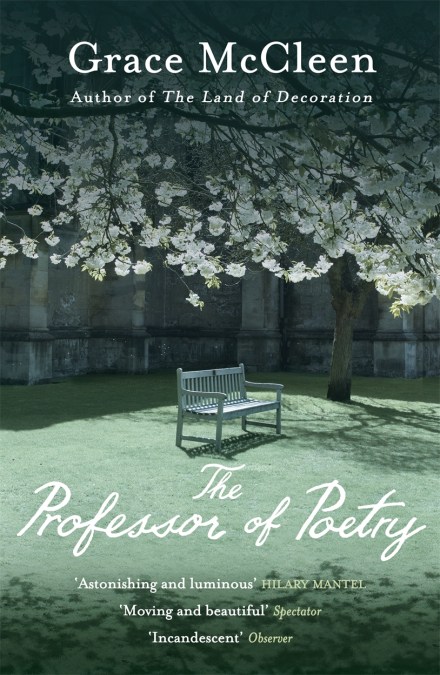Elizabeth Stone, a respected academic, has a new lease on life. In remission from cancer, she returns to the city where she was a student over thirty years ago to investigate some little-known papers by T. S. Eliot, which she believes contain the seeds of her masterpiece; a masterpiece that centres on a poem given to her when she was eighteen by the elusive Professor Hunt…
But as the days pass in the city she loves and her friendship with Professor Hunt is rekindled, her memories return her to a time shadowed by loneliness, longing and quiet despair, and to an undeclared but overwhelming love. Paralysed by the fear of writing something worthless, haunted by a sense of waste, Elizabeth Stone comes to realise she is facing the biggest test of her life.
As in her acclaimed debut The Land of Decoration, Grace McCleen gives an intense evocation of place, an unflinching portrayal of a character by turns comic, absurd, and disturbing, and a powerful sense of the transcendent within the ordinary. Profound and hypnotic, The Professor of Poetry devastates even as it exhilarates and echoes long after it has been closed.
But as the days pass in the city she loves and her friendship with Professor Hunt is rekindled, her memories return her to a time shadowed by loneliness, longing and quiet despair, and to an undeclared but overwhelming love. Paralysed by the fear of writing something worthless, haunted by a sense of waste, Elizabeth Stone comes to realise she is facing the biggest test of her life.
As in her acclaimed debut The Land of Decoration, Grace McCleen gives an intense evocation of place, an unflinching portrayal of a character by turns comic, absurd, and disturbing, and a powerful sense of the transcendent within the ordinary. Profound and hypnotic, The Professor of Poetry devastates even as it exhilarates and echoes long after it has been closed.
Newsletter Signup
By clicking ‘Sign Up,’ I acknowledge that I have read and agree to Hachette Book Group’s Privacy Policy and Terms of Use
Reviews
Her new novel catapults her into the literary big league . . . McCleen invests this ostensibly dry subject matter with enormous poignancy and eroticism
An astonishing and luminous novel . . . every line is newly felt and freshly experienced. The reader is kept guessing: is this an emotional farce and an intellectual tragedy, or is it the opposite? The novel's ironies are multiple and stinging . . . Grace McCleen is an author who, with only her second novel, is setting her own clever agenda. She is a finished artist, but performs on the page with all the aerial grace of someone who senses no limits to what she can do.
Moving and beautiful . . . this is a remarkable piece of work, empathetic, intelligent and genuinely poetic
Enchanting . . . An utterly fascinating piece for poetry-lovers, and also an extremely poignant read.
A grand tragedy with an intimate focus . . . for those who readers sympathetic to Anne's regrets in Jane Austen's Persuasion, or who find richness in the academic wrangling of AS Byatt's literary sleuths and lovers in Possession, there is much here to adore. McCleen's manipulation of suspense is extraordinary - hope for Elizabeth's enlightenment lurks in the shadows of her insecurities and emotional blind spots, and exploration of these dark places renders the novel sinewy with tension . . . her Prufrock-like world is painted with bewitching vitality . . . the narrative sweeps with a sumptuous musicality.
An intricate tapestry in which past and present mingle to mesmerising effect . . . what eloquence! There are sentences here of such agile cleverness, charged with wit and beauty and enchantment.
It's McCleen's unflinching dedication to detail that will enchant readers. This novel has obviously been pored over, cherished and perfected . . . [her] graceful weaving through the present and past of her main character produces an intriguing - and original - story.
McCleen doesn't make Elizabeth easy to like and this is part of the professor's charm. She doesn't "do" summer, most definitely does not do love poetry, and would like to teach Virginia Woolf a thing or two about semicolons . . . an intricate tapestry in which past and present mingle to mesmerising effect . . . what eloquence! There are sentences here of such agile cleverness, charged with wit and beauty and enchantment.

